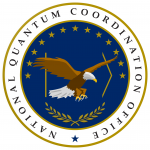Original Link: Archived PDF: Strengthening U.S. Leadership in Quantum Information Science Highlighting Argonne’s Q-NEXT QIS Research Center - National Quantum Initiative.pdf
Posted on October 20, 2020
This is the first Director’s Letter from the National Quantum Coordination Office. Roughly each month I will write “from” a different research center about the NQCO’s progress coordinating Quantum Information Science (QIS) activities. Learn more about Argonne’s Q-NEXT QIS Research Center by going to https://www.q-next.org/.
In August, the White House Office of Science and Technology Policy (OSTP) was proud to join the Department of Energy to announce up to $625 million for the establishment of quantum information science (QIS) research centers nationwide. This critical investment will help maintain and strengthen American leadership in QIS for years to come, and we are excited to have Argonne’s Q-NEXT QIS Research Center as part of this effort.
Across its Universities, Companies, and Government Labs, the United States is a world-leader in quantum information science (QIS) and emerging quantum technologies. And QIS promises to enable new forms of computing, sensing, and networking. About two years ago, OSTP brought 13 agencies and offices across the government together to write a National Strategic Overview for Quantum Information Science. In December 2018, President Trump signed the National Quantum Initiative Act (NQI) into law, which established the National Quantum Coordination Office (NQCO) and other coordination and advisory mechanisms, a quantum industry consortium, and called for the establishment of the quantum information research centers and new quantum R&D programs across the Federal government. The NQCO sits within OSTP and is tasked with supporting the NQI and coordinating QIS activities across the US Federal government, industry, and academia to ensure that America continues to be a strong global leader in QIS.
Basic research lays the foundation for our economic prosperity and national security. The US QIS strategy has six broad goals: take a science first approach, grow a quantum-smart workforce, nurture the nascent quantum industry, balance the economic and security implications of quantum science, invest in the necessary infrastructure, and cooperate internationally to grow the marketplace of ideas, talent, and industry with countries who share our values.
The National Quantum Initiative must be an all-of-government and all-of-nation endeavor. The quantum talent is not all in one place. Nor are the people who know what the hard problems are that need to be solved. These technical and domain experts are spread out across the government and private sector. We need broad participation and collaboration. By working together we can avoid wasting time duplicating effort or going down the wrong technical path while still leaving plenty of room to explore. We need partnerships to translate these new discoveries to real and useful applications for society.
That’s why it’s so exciting to see the Agency announcements that have come out this summer. NSF launched three Quantum Leap Challenge Institutes. DOE named five new QIS Research Centers. The Quantum Economic Development Consortium, led by NIST, has a partnership agreement in-place and 180 companies and organizations lined up to sign it. The NQI Advisory Committee of 23 members from across the community was established. And expansion of the core QIS programs across the civilian, defense, and intelligence pillars of our fundamental research enterprise builds off 25+ years of intentional funding. As we move from the kick-off of the NQI to the critical implementation phase, we have a great base from which to accelerate.
Quantum Information Science is a major priority of the White House and OSTP: the President’s Fiscal Year 2021 Budget included a commitment to double investment in quantum R&D over two years. But money is not enough. As you know – as anyone who has been leading research in this field knows – it comes down to the quality of the people on your team. Our future success depends on bringing new talent into the field. That’s why we launched with NSF the Q-12 partnership with companies and professional societies committing to providing educational materials to students over the next 10 years. We hope you will get involved and support this and other national-level initiatives.
For those of us who have already devoted our professional careers to building a quantum computer or another area of QIS, this excitement may seem obvious. But one of the most important messages that we can all convey is that quantum is a great career option generally, and there are many places—government, industry, and academia—where you can have unbelievable impact in this new field. There are many different ways to contribute.
I want to thank the Q-NEXT QIS Research Center at Argonne National Laboratory for “hosting” us this month. Q-NEXT’s mission is to deliver quantum interconnects and establish a national foundry to provide pristine materials for new quantum devices. Highlighting only one component of a $25 million dollar per year, 90 or so Principal Investigator center isn’t easy! But in particular, I’m excited to see Q-NEXT’s focus on rigorous development of materials science for quantum information science. One thing we have learned over that last two decades is how important long-term and sustained improvement of materials properties is for increasing quantum device performance (which then enables new quantum information science). So I believe professionalizing this cycle of materials growth, device design, measurement, and characterization is key to success and a place where the DOE National Labs—in support of and in addition to industry and academia—can play a unique and necessary role. I’m also really curious to see what the National Quantum Devices Database will end up looking like. Good luck team!
Next time: The quantum questions.
Charles Tahan is the Assistant Director for Quantum Information Science at the White House Office of Science and Technology Policy and Director of the National Quantum Coordination Office.
| The seal of the National Quantum Initiative. Find out more at www.quantum.gov |
